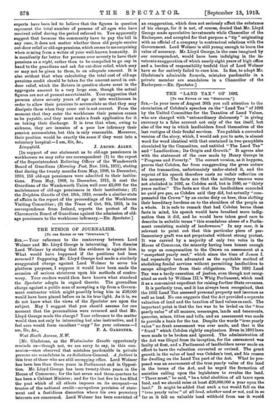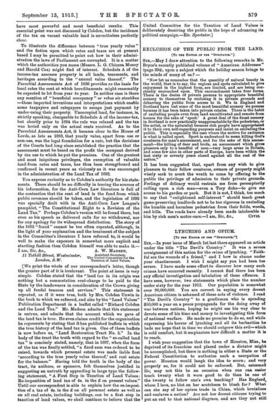THE "LAND TAX" OF 1692.
[To THE EDITOR OF TIM "SPECTATOR."] Sta,—In your issue of August 30th you call attention to the circulation of Cobden's speeches on the "Land Tax" of 1692 by the United Committee for the Taxation of Land Values, who are charged with "extraordinary dishonesty" in giving currency to a false account not only of the tax itself, but also of the way in which landholders freed themselves of the last vestiges of their feudal services. You publish a corrected version of the story, which, I would ask you to note, is almost word for word identical with that contained in two pamphlets circulated by the Committee, and entitled "The Land Tax" and "Landlordism; Its Origin and Growth." It agrees also with the statement of the case made by Henry George in "Progress and Poverty." The correct version, as it happens, proves that Cobden, far from exaggerating the gross nature of the transaction, unfortunately under-stated it, and the reprint of his speech therefore casts no unfair reflection on his memory. The facts are that the military tenures were not abolished in 1692, as Cobden said, but in 1660, or "thirty years earlier." The facts are that the landholders conceded no quid pro quo, as Cobden said they did, but actually "com- pensated the Crown" by an excise duty on beer, thus shifting their hereditary burdens on to the shoulders of the people as a whole. It is safe to remark that bad Cobden borne these facts in mind, his speech would have breathed more indig- nation than it did, and he would have taken good care to describe in suitable terms "this scandalous abuse of a Parlia- ment consisting mainly of landowners." In any case, it is relevant to point out that this particular piece of par- liamentary graft was not perpetrated without strong protest. It was carried by a majority of only two votes in the House of Commons, the minority having been honest enough to urge as compensation to the Crown an assessment at a "competent yearly rent," which since the time of James I. had repeatedly been advocated as the equitable method of abolishing feudal services without permitting landholders to escape altogether from their obligations. The 1692 Land Tax was a tardy execution of justice, even though not recogr,:- nized as such by William III.'s Whig Parliament, which used it as a convenient expedient for raising further State revenues.
It is perfectly true, and it has always been recognized, that the 1692 Land Tax assessed personal property and iucomes as well as land. No one suggests that the Act provided a separate valuation of land and the taxation of land values as such. The important point is that the tax was to be levied on the "true yearly value" of all manors, messnages, lands and tenements, quarries, mines, tithes and tolls, and an assessment was made to provide a basis for the tax. Despite the words "true yearly value" no fresh assessment was ever made, and that is the "fraud" which Cobden rightly emphasizes. Even in 1692 laws were made to be broken and ignored. The administration of the Act was illegal from its inception, for the assessment was faulty at first, and a Parliament of landholders never made an effort to have the valuation corrected or revised. The great growth in the value of land was Cobden's text, and his reason for dwelling on the Land Tax part of the Act. What be pro- posed was an assessment of the true yearly value of the land in the terms of the Act, and he urged the formation of societies calling upon the legislature to revalue the land. "There must," he said, "be a total abolition of all taxes upon food, and we should raise at least 220,000,000 a year upon the land." It might be added that such a tax would fall on the "true yearly value" of all land, whether used or not, and in so far as it fell on valuable land withheld from use it would
have most powerful and most beneficial results. This essential point was not discussed by Cobden, but the incidence of the tax on vacant valuable land is nevertheless perfectly clear.
To illustrate the difference between "true yearly value" and the fiction upon which rates and taxes are at present
based I may be permitted to point out how in their admini- stration the laws of Parliament are corrupted. It is a matter which the authorities you name (Messrs. L. G. Chiozza Money and Harold Cox) might find of interest. Schedule A of the income-tax assesses property in all lands, tenements, and heritages according to the "annual value thereof." The Parochial Assessments Act of 1836 provides as the basis for local rates the rent at which hereditaments might reasonably be expected to let from year to year. In neither case is there any mention of "beneficial occupancy" or rebus sic stantibus —those imported inventions and interpretations which enable some taxpayers and ratepayers to escape just payment by under-using their property. Unoccupied land, for instance, is, strictly speaking, chargeable to Schedule A of the income-tax, but shortly prior to 1884 the rule was relaxed and the tax was levied only on the actual rents received. As to the Parochial Assessments Act, it became clear to the House of Lords, as late as 1893, that yearly value, apart from use or non-use, was the legal foundation for a rate, but the decisions of the Courts had long since established the practice that the assessment must be based on the profit the occupant derived by the use to which he put the premises. One of the greatest and most iniquitous privileges, the exemption of valuable land from rates and taxes, has thus been strengthened and confirmed in recent years as viciously as it was encouraged in the administration of the Land Tax of 1692.
You express curiosity as to Cobden's authority for his state- ments. There should be no difficulty in tracing the sources of his information, for the Anti-Corn Law literature is full of the contention that the rent of land is the fund from which public revenues should be taken, and the legislation of 1692 was specially dealt with in the Anti-Corn Law League's pamphlet, "The Constitutional Right to a Revision of the Land Tax." Perhaps Cobden's version will be found there, but even so his speech as delivered calls for no withdrawal, nor for any apology for its widespread distribution. The story of the 1692 " fraud " cannot be too often repeated, although, in the light of your explanation and the treatment of the subject in the Committee's literature I have referred to, it would be well to make the exposure in somewhat more explicit and startling fashion than Cobden himself was able to make it.—
11 Tothill Street, Westminster, Assistant Secretary,
The United Committee for the
London, S. W. Taxation of Land Values.
[We print the whole of our correspondent's letter, though the greater part of it is irrelevant. The point at issue is very simple. Cobden stated that the "land tax in its origin was nothing but a commutation rent-charge to be paid to the State by the landowners in consideration of the Crown giving up all feudal tenures and services." This statement is repeated, as if it were true, both by Mrs. Cobden Unwin in the book to which we referred, and also by the "Land Values" Publication Department in a leaflet called "Richard Cobden and the Land Tax." Mr. Madsen admits that this statement is untrue, and admits that the account which we gave of the land tax is true. He even claims credit for the organization he represents by stating that it has published leaflets in which the true history of the land tax is given. One of these leaflets is now before us, "Land Restoration Tract No. 5." In the body of the tract the truth with regard to the "so-called land tax" is concisely stated, namely, that in 1697, when the form of the tax was finally settled, "a fixed sum was ordered to be raised, towards which personal estate was made liable first 'according to the true yearly value thereof,' and real estate for the balance." Having told the truth in the body of the tract, its authors, or sponsors, felt themselves justified in suggesting an untruth by appending in large type the follow- ing statement, "A First Step in Taxation of Land Values : Re-imposition of land tax of 4s. in the £ on present values." Until our correspondent is able to explain how the re-imposi- tion of a tax of 4s. in the £ on all personal estate as well as on all real estate, including buildings, can be a first step in taxation of land values, we shall continue to believe that the United Committee for the Taxation of Land Values is deliberately deceiving the public in the hope of advancing its political campaign.—En. Spectator.]











































 Previous page
Previous page